Spelman's Scholar Showcase Celebrates Innovation, Community Impact and Academic Excellence
From Grammy Awards to Urban Heat Mapping: Spelman's First Inclusive Research Showcase Reveals Hidden Talents
Spelman College's Office of Research, Innovation and Collaboration (ORIC) and the Teaching Resource and Research Center TRRC) hosted the first-ever Scholar Showcase earlier this fall, bringing together a diverse array of faculty, scholars, and practitioners whose work spans from Grammy-nominated music production to menstrual health education, urban heat mapping, and the intricacies of political party nomenclature.
Titled "Rooted and Rising," the daylong event featured lightning talks, knowledge exchange sessions, and networking opportunities that underscored the breadth of scholarship emerging from a historic women's college. The showcase drew presenters whose work addresses some of society's most pressing challenges while celebrating creative excellence.
"I would say the number one thing I want the community to realize is that there are so many amazing members in our midst," said Margaret Farrow, director of research development and sponsored programs for the AUC-GRANTED Initiative and member of the Research Day committee.
"Faculty and staff in the Spelman community are living out their passions — some are directly related to the work they do here, but for some of them, it is what they do outside of Spelman that just blows my mind. It's simply phenomenal."
A First for Faculty and Staff Together
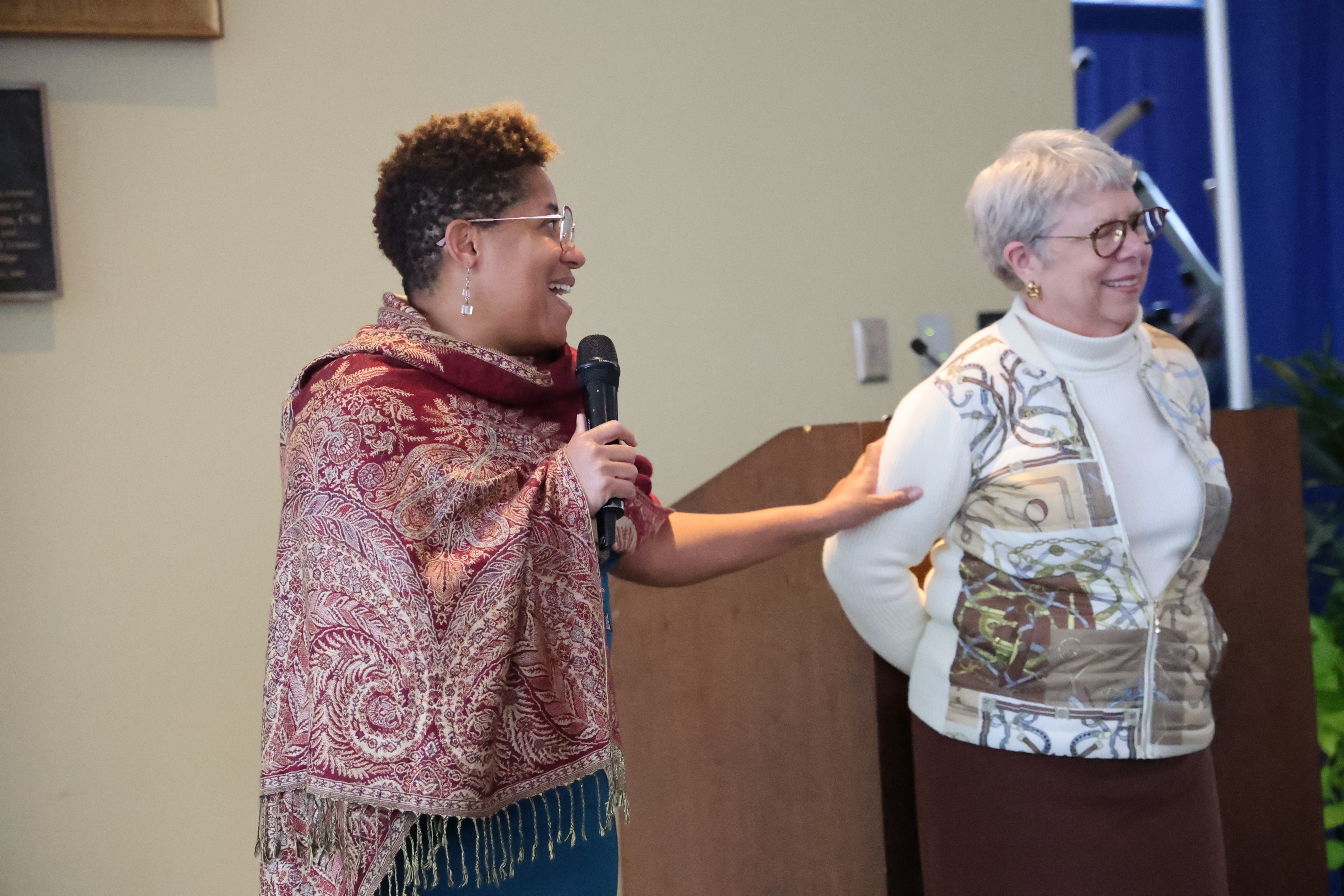 What made this showcase unprecedented was its inclusive structure. Brandi Taylor, C'2001, ORIC's director of undergraduate research and creative pursuits, emphasized the significance of the approach they took with "Rooted and Rising . . .
What made this showcase unprecedented was its inclusive structure. Brandi Taylor, C'2001, ORIC's director of undergraduate research and creative pursuits, emphasized the significance of the approach they took with "Rooted and Rising . . .
"This is the first time we've had faculty and staff participate. I loved that we had a variety of staff and faculty from various departments present as subject matter experts in their fields; but we also had faculty and staff who presented on topics outside of what they do from nine to five."
Taylor continued: "It's just a great way for us to see the wealth of knowledge exchange that we can have on campus, as well as opportunities to expand beyond the scope of what that person is currently working on beyond the gates."
The turnout exceeded organizers' expectations. "The hunger that we have on campus is evident in the turnout experienced at our inaugural event," Taylor noted. "It was something to behold and screams 'we needed this'."
Alisa Butler, operations manager in ORIC and manager of AUC-GRANTED Research Concierge, captured the event's energy: "This was an extraordinary and informative event. It was fascinating to hear each presenter's reasoning behind what sparked their research and to follow their journeys of discovery across various sectors. I would describe it as a pot of gumbo — a blend of diverse research flavors that came together beautifully to please the intellectual palate."
Breaking Down Barriers Through Scholarship
Narketta Sparkman-Key, Ph.D., associate provost for faculty affairs, delivered a presentation that embodied the showcase's mission to amplify community impact. An internationally recognized speaker and advocate who has delivered lectures and workshops from Costa Rica to Nepal, Sparkman-Key's work focuses on preparing culturally informed practitioners across helping professions.
Her TEDx talk, "The Silver Dollar Approach to Preventing Black Adolescent Suicide," has touched thousands, exemplifying how research rooted in community needs can create pathways for equity and empowerment on a global scale.
Music Meets Academia
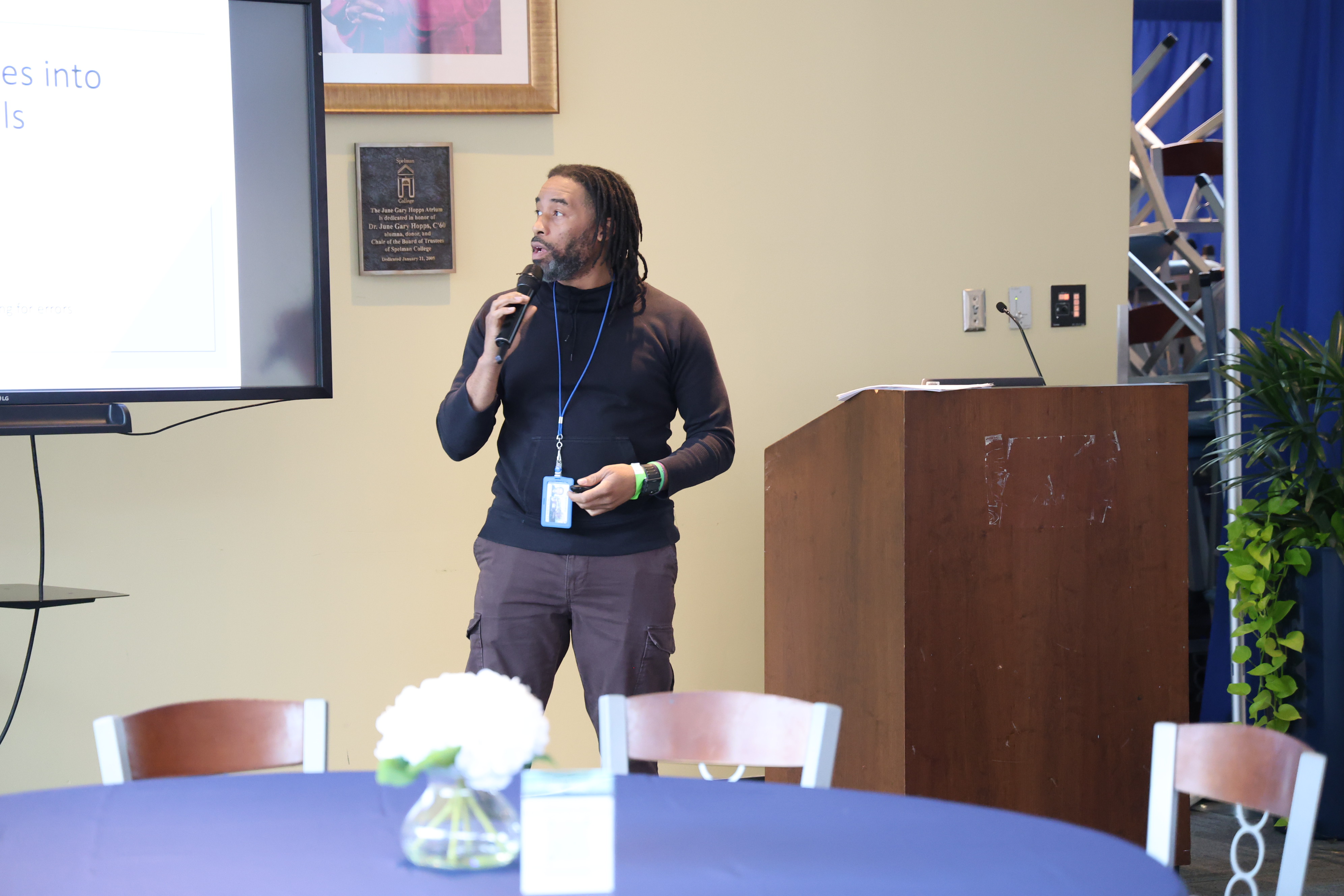 Among the morning presentations was instructor of music technology Derek Linzy's session deconstructing a Grammy-nominated album in real time. The two-time Grammy-nominated engineer and producer, who worked with musical genius Prince at Paisley Park, walked attendees through the creative and technical processes behind album production.
Among the morning presentations was instructor of music technology Derek Linzy's session deconstructing a Grammy-nominated album in real time. The two-time Grammy-nominated engineer and producer, who worked with musical genius Prince at Paisley Park, walked attendees through the creative and technical processes behind album production.
What made his presentation particularly significant was the access it represents. Linzy revealed that Spelman is one of only eight schools in Georgia offering Pro Tools certification — industry-standard training that levels the playing field for students pursuing careers in music production and audio engineering.
"It's not often that you see the intersection of commercial music production and academic scholarship presented so accessibly," said one attendee. Linzy's presentation exemplified how Spelman scholars bridge theory and practice across disciplines.
Tackling Health Disparities
The sessions addressed critical public health concerns affecting Black communities. Morgan Gravely, MPH, ORIC's Undergraduate Research and Training Program coordinator, presented "'Be You, Be Well': STD/STI Testing in Metro Atlanta," highlighting Georgia's ranking among the top 10 states for sexually transmitted infections. Atlanta holds the highest rates within the state, and Gravely's research examines barriers to testing among Black and minority populations.
Denisse Gaines, a yoga instructor in the Wellness Center, introduced a self-care calendar and planner designed to help individuals incorporate wellness techniques into daily life, addressing the often-overlooked connection between mental wellness and routine practice.
Butler reflected on the breadth of topics covered: "It was captivating to experience the spoken word and harmonious singing, the creative combination of gaming with biology, and the emphasis on self-care to prevent burnout, among many other topics."
Staff Scholarship: Beyond the Nine-to-Five
In a groundbreaking moment that exemplified the showcase's inclusive vision, LaDiamond Lett, program coordinator for institutional effectiveness, presented her children's book "Zora's Bracelet: What's a Period?" The book helps girls understand menstrual health through the eyes of a 7-year-old, making period education culturally relevant and age-appropriate.
Lett's presentation demonstrated precisely what Taylor described as work "outside of what they do — not work from their nine to five" — scholarship that enriches the entire community and addresses critical health literacy gaps, providing accessible, shame-free menstrual education particularly valuable for girls in underserved communities.
Environmental Justice and Urban Resilience
Na'Taki Osborne Jelks, Ph.D., MPH, C'95, assistant professor of environmental and health sciences, presented #UrbanHeatATL, a collaborative initiative mapping heat islands across Atlanta neighborhoods. The project brings together higher education institutions, community-based organizations, and government agencies to identify communities disproportionately affected by extreme heat — the leading cause of weather-related deaths in the United States.
Using participatory science approaches with hand-held mobile sensors and GPS technology, students and community scientists are collecting and analyzing data to inform local officials about heat mitigation strategies. The work is particularly urgent as extreme heat events are expected to increase.
Unexpected Collaborations Emerge
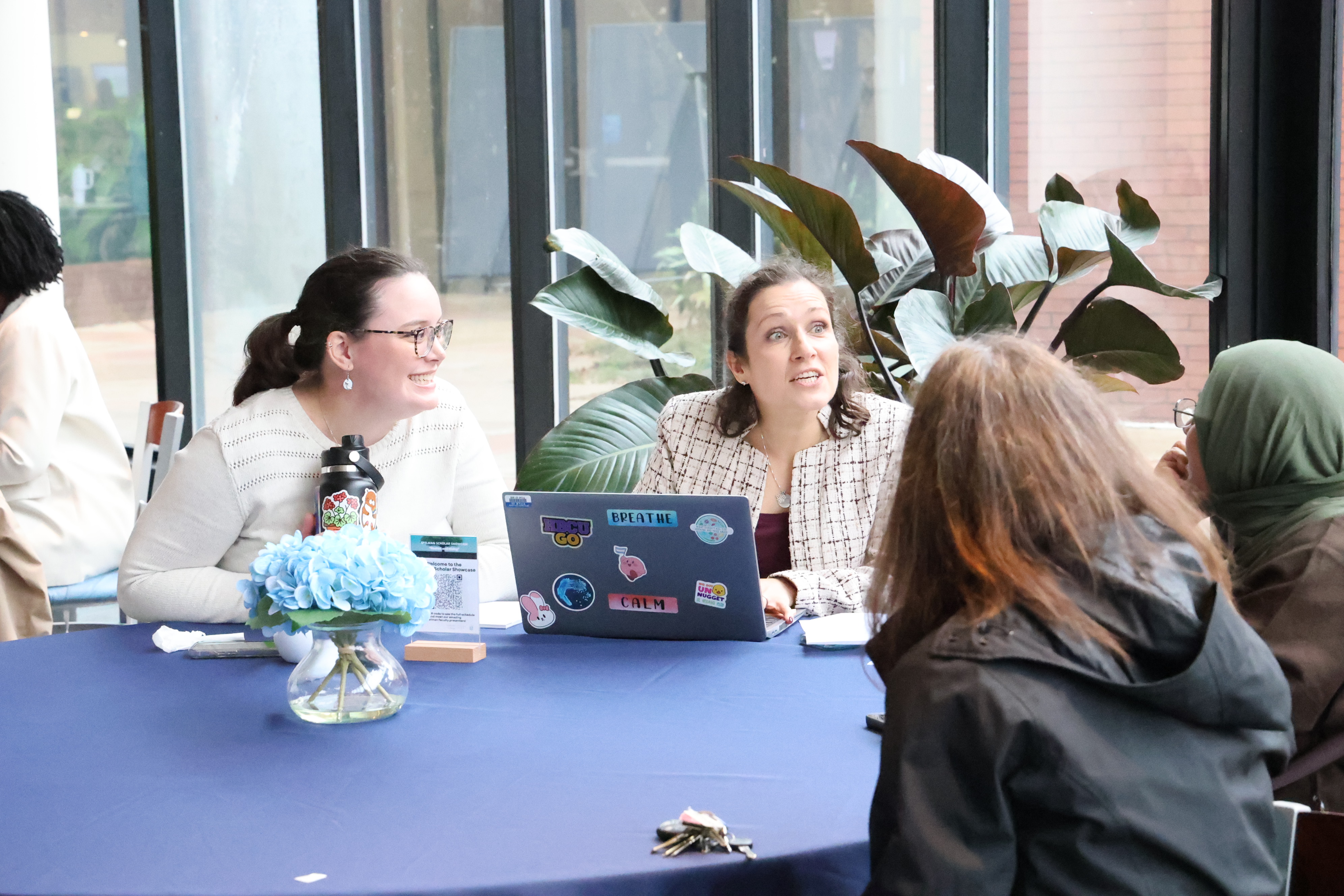 Nicole Johnston, Ph.D., lecturer in biology, presented on the Spelman Arboretum Project, highlighting an environmental initiative that is breaking down disciplinary silos. Atlanta, known as "a city in a forest," is home to Spelman's own piece of that canopy. Johnston discussed how students, staff, and faculty from math, biology, psychology, and even English are collaborating on projects like the Tree Map initiative, mapping nearly 800 trees on campus.
Nicole Johnston, Ph.D., lecturer in biology, presented on the Spelman Arboretum Project, highlighting an environmental initiative that is breaking down disciplinary silos. Atlanta, known as "a city in a forest," is home to Spelman's own piece of that canopy. Johnston discussed how students, staff, and faculty from math, biology, psychology, and even English are collaborating on projects like the Tree Map initiative, mapping nearly 800 trees on campus.
"We had a collaboration at the Showcase," Taylor recalled, "and Johnston, one of the speakers, talked about the trees on campus and how they are trying to collaborate and find professors from the literature, media and writing department. The group already has faculty from physics and math involved. And one would not think about tree research and how you can collaborate on that; but it just spoke to the variety of opportunities we have at Spelman."
Education and Equity
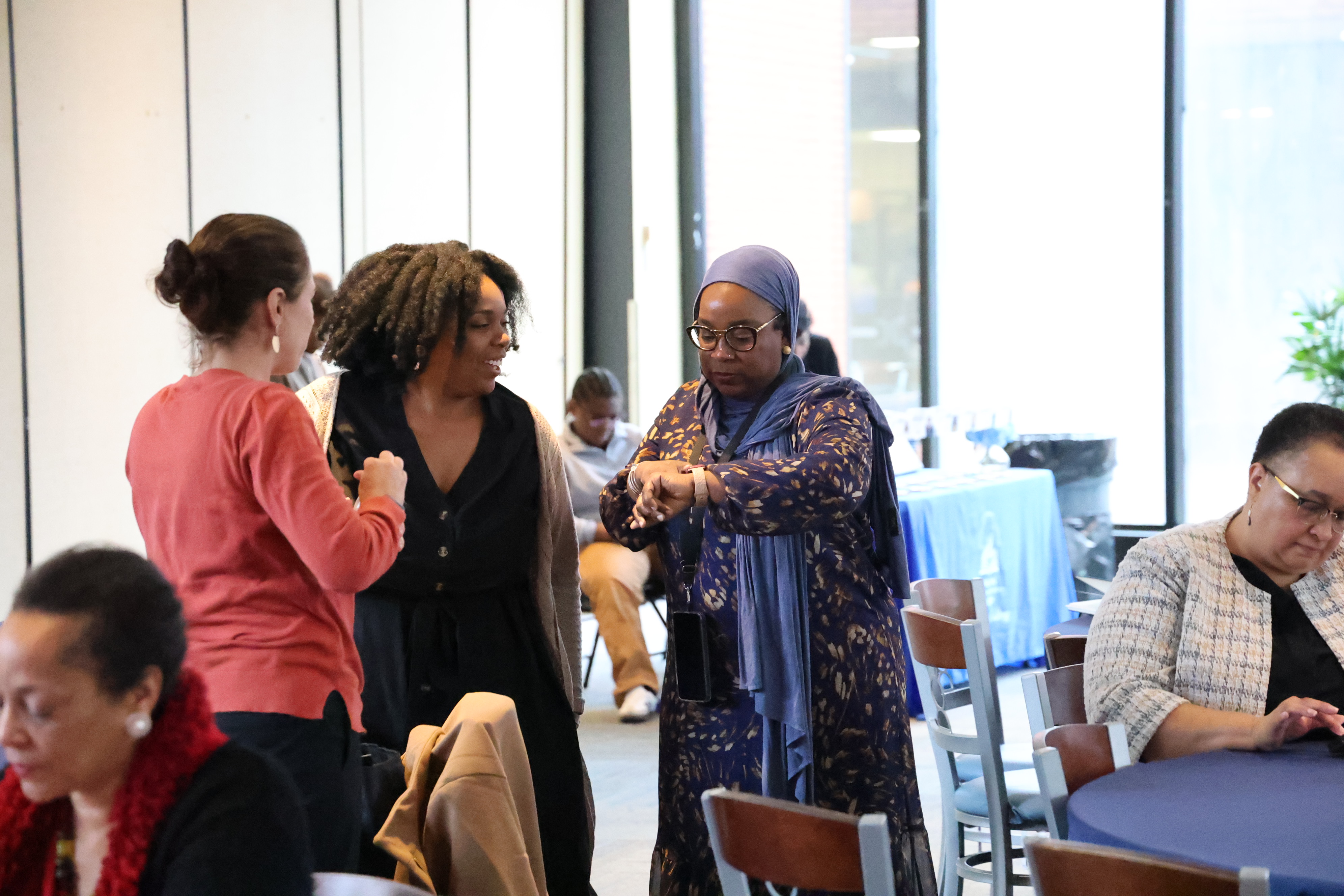 Several presentations examined educational access and equity. Jilo Tisdale, director of the Bonner Office of Community Service, discussed SpelREADS, a literacy program launched in 2017 that examines the impact of one-on-one tutoring between Atlanta Public Schools students and Spelman reading guides on reading achievement.
Several presentations examined educational access and equity. Jilo Tisdale, director of the Bonner Office of Community Service, discussed SpelREADS, a literacy program launched in 2017 that examines the impact of one-on-one tutoring between Atlanta Public Schools students and Spelman reading guides on reading achievement.
Bailey Brown, Ph.D., assistant professor of sociology and anthropology, gave a talk titled "Kindergarten Panic: Racialized Work and the Search for a Racially Inclusive School," drawing from her recent book. Brown examined how Black parents across class backgrounds engage in ongoing labor to monitor racial climates within schools and protect their children from marginalization, navigating a landscape shaped by race-based discrimination and residential segregation even in an era of school choice.
Anna Powolny Ventura, Ph.D., senior lecturer in biology, showcased "Press Play to Learn," and showed the video game she created to teach innate immunity in an introductory biology course. Attendees were eager to engage with the game firsthand to evaluate its educational efficacy, exemplifying how gamification can make complex science more accessible.
STEM and Beyond
Farrow's observations about the showcase's diversity were particularly evident in the STEM presentations. "The diversity of passions and talents and gifts we saw in just in the first half of the day is just an amazing showcase of who all belongs to and is a part of the Spelman community," she said. "We are amazing. You just have to smile when you realize they are part of the community that I happen to be a part of as well."
Shanina Sanders Johnson, Ph.D., associate professor of chemistry and biochemistry, presented on engaging students in organic chemistry through research and culturally relevant projects, training them to advocate for science using the knowledge they have obtained. In her organic synthesis laboratory, students create novel compounds relevant to medicinal chemistry while learning how organic chemistry affects their lives and communities.
Stephanie Byrd, Ed.D., manager of ORIC’s undergraduate research initiatives in post-graduate pathways, presented research that examined the lived experiences of Black women who completed STEM doctorates at predominantly white institutions, revealing persistent challenges including isolation, microaggressions, and limited institutional support. Her findings highlight the urgent need for systemic reforms in higher education to foster inclusivity and equity.
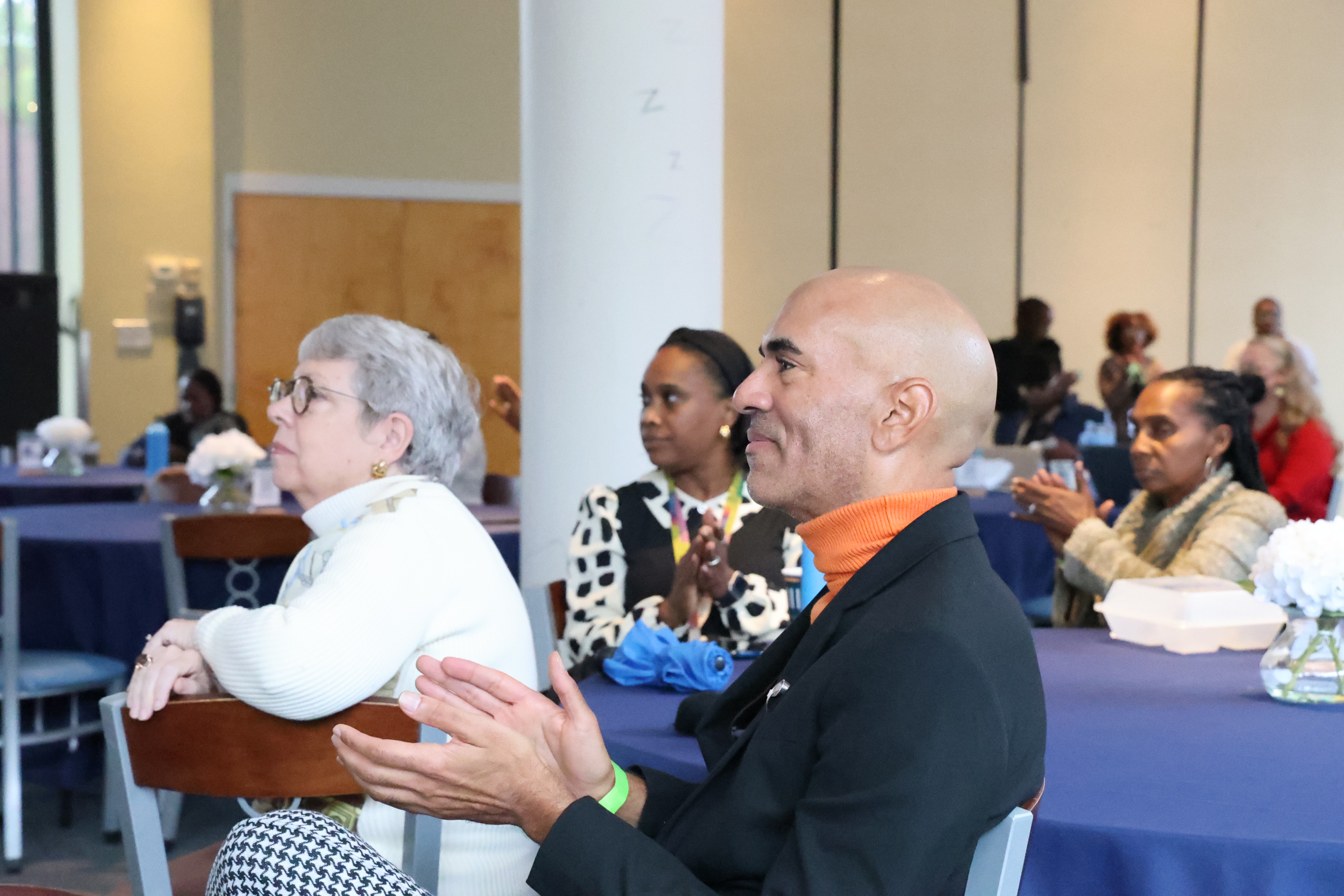 Angelino Viceisza, Ph.D., professor of economics, presented findings from randomized controlled trials at Spelman College examining metacognitive awareness and academic performance, contributing to evidence-based approaches to student success.
Angelino Viceisza, Ph.D., professor of economics, presented findings from randomized controlled trials at Spelman College examining metacognitive awareness and academic performance, contributing to evidence-based approaches to student success.
Amber Reed, Ph.D., assistant professor of international studies, discussed youth aspirations in rural South Africa, focusing on socioeconomic aspirations and broader demographic trends in the Eastern Cape province, bringing a global perspective to questions of youth development and opportunity.
Finding Strength in Biblical Narratives
Renee Jones, program manager in economics, offered a presentation that bridged faith and resilience, examining the stories of women in the Bible — Tamar, Bathsheba, and Rahab. Jones explored how these biblical narratives provide reassurance and perspective, showing that despite challenges and adversity, everything will be okay. Her presentation demonstrated how spiritual scholarship and ancient texts continue to offer guidance and comfort in contemporary life.
Arts, Politics and Sustainability
The diversity of scholarship extended to the arts and social sciences. Nicci Carr, administrative assistant in archives, presented "To Lights, Camera, Action....With Love," her culminating MFA thesis project at Randolph College — an autobiographical solo show weaving together drama, poetry, music and multimedia to explore themes of survival, identity, faith and artistic purpose.
Matthew McManus, Ph.D., assistant professor of political science, offered "Liberal Socialism: A Liberalism of Hope in the Age of Trump," presenting his recent book that argues for a more democratic liberal socialism in response to failed neoliberal technocracy.
John Wagner Givens, Ph.D., associate professor of international studies, investigated how political party names signal ideology, issues, and supporters, analyzing the V-Dem V-Party Dataset's catalog of over 3,000 political parties across time and geography, identifying six core categories including religious, militant/combative, modernity, institutional legitimacy, worker-based, and personality-driven descriptors.
Marla Byrd, M.Ed., C'99, senior instructional technologist, explored how AI innovations are transforming higher education and impacting student success, examining necessary shifts from information delivery models to facilitation and mentorship roles while addressing ethical considerations and the importance of maintaining human connection amid technological transformation.
Iesha Baldwin, C'2019, the College's inaugural sustainability coordinator, evaluated Spelman's operations and implemented programs to enhance social and environmental sustainability, demonstrating the Spelman’s commitment to institutional responsibility and climate action.
Butler's reflection captured the sustained engagement throughout the day: "Each presentation was thought-provoking, moving, and uniquely engaging. I can honestly say that every presenter held my attention from start to finish. Excellent job all around!"
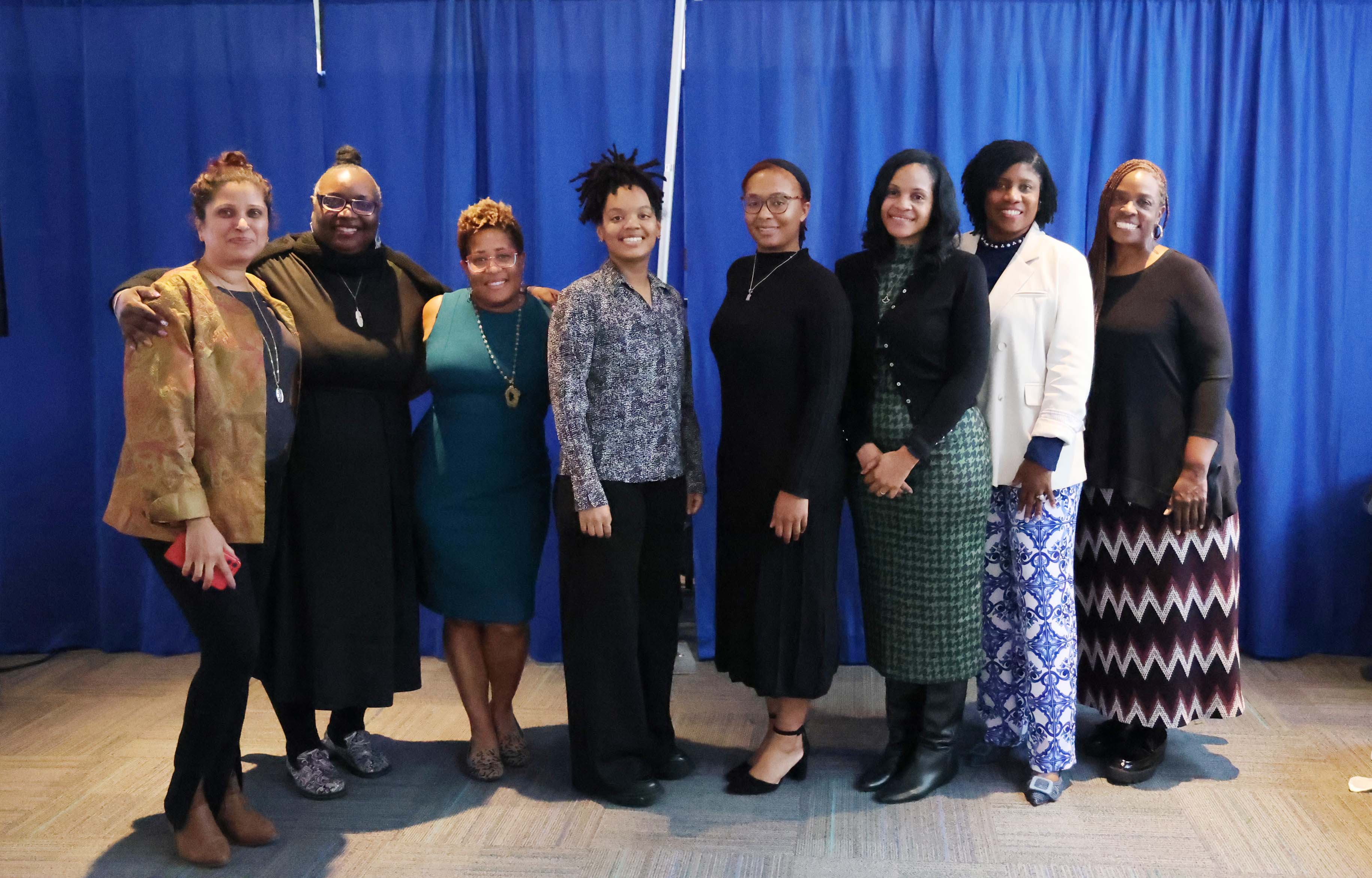
A Foundation for Future Showcases
Farrow captured what made the day so significant: "We have amazing people in our community doing amazing things that have impact beyond the four walls of Spelman because they're doing what they want — and it's not only faculty, but also staff."
Taylor's observations underscored the event's transformative potential: "It's just a great way for us to see the wealth of knowledge exchange that we can have on campus, as well as opportunities to expand beyond the scope of what that person is currently working on."
The event concluded with closing remarks, recognition of presenters, and audience reflection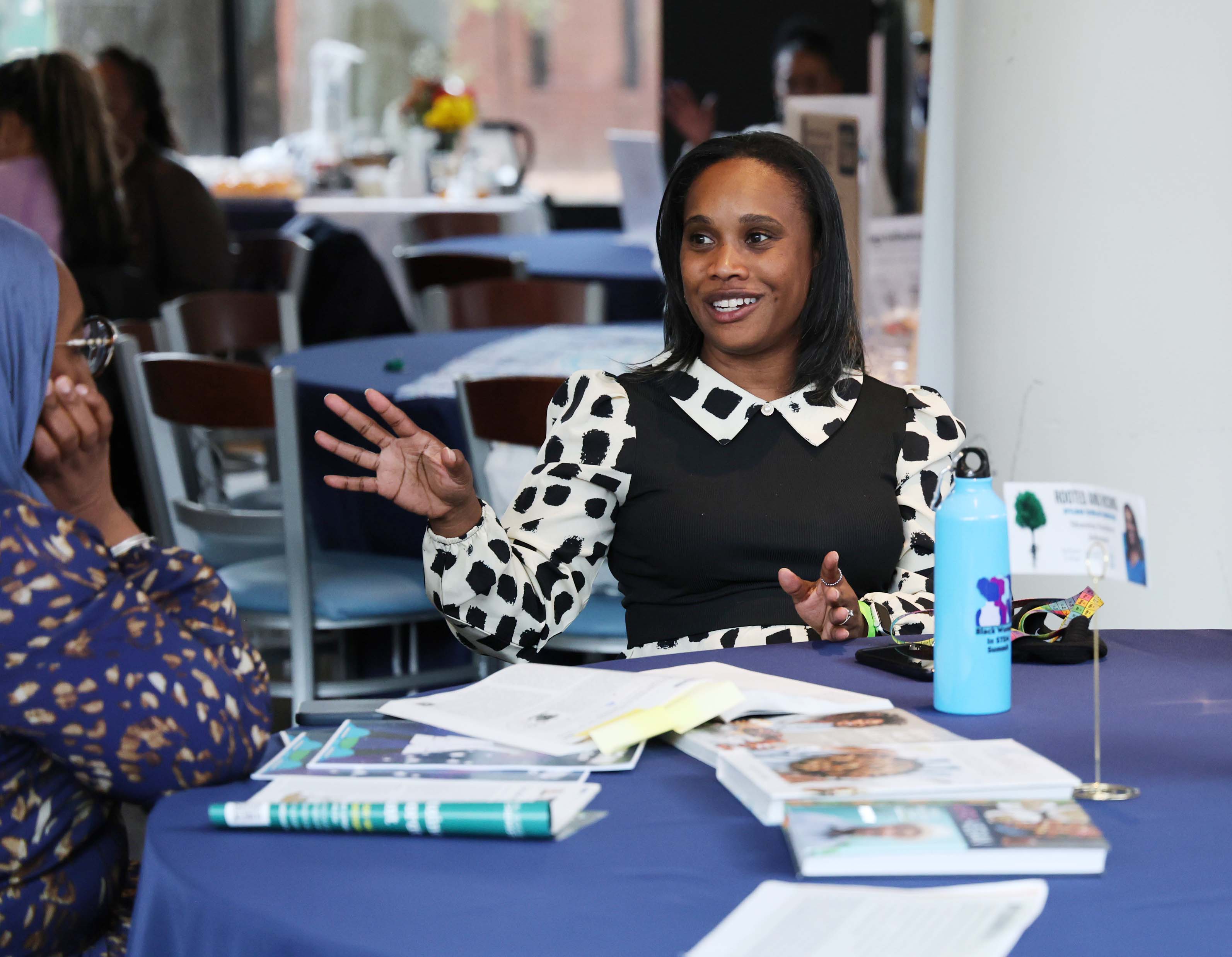 and networking — a fitting end to a day that showed the richness and relevance of scholarship at Spelman College.
and networking — a fitting end to a day that showed the richness and relevance of scholarship at Spelman College.
As the College's first Scholar Showcase to include both faculty and staff presenters, "Rooted and Rising" established a new tradition of celebrating academic excellence while reinforcing Spelman's commitment to producing scholarship that matters — work that is deeply rooted in community needs while rising to meet global challenges.
The turnout, as Taylor observed, proved that "the hunger" for this kind of knowledge exchange exists on campus and that such events are not merely beneficial but essential to the intellectual life of the institution.
Learn more about the Office of Research, Innovation and Collaboration at Spelman College.
